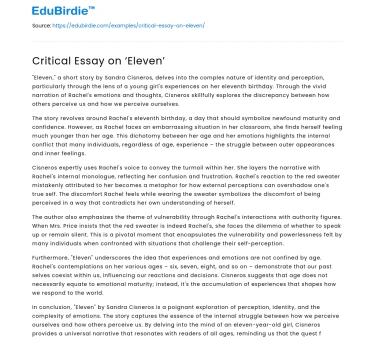"Eleven," a short story by Sandra Cisneros, delves into the complex nature of identity and perception, particularly through the lens of a young girl's experiences on her eleventh birthday. Through the vivid narration of Rachel's emotions and thoughts, Cisneros skillfully explores the discrepancy between how others perceive us and how we perceive ourselves.
The story revolves around Rachel's eleventh birthday, a day that should symbolize newfound maturity and confidence. However, as Rachel faces an embarrassing situation in her classroom, she finds herself feeling much younger than her age. This dichotomy between her age and her emotions highlights the internal conflict that many individuals, regardless of age, experience – the struggle between outer appearances and inner feelings.
Save your time!
We can take care of your essay
- Proper editing and formatting
- Free revision, title page, and bibliography
- Flexible prices and money-back guarantee
Cisneros expertly uses Rachel's voice to convey the turmoil within her. She layers the narrative with Rachel's internal monologue, reflecting her confusion and frustration. Rachel's reaction to the red sweater mistakenly attributed to her becomes a metaphor for how external perceptions can overshadow one's true self. The discomfort Rachel feels while wearing the sweater symbolizes the discomfort of being perceived in a way that contradicts her own understanding of herself.
The author also emphasizes the theme of vulnerability through Rachel's interactions with authority figures. When Mrs. Price insists that the red sweater is indeed Rachel's, she faces the dilemma of whether to speak up or remain silent. This is a pivotal moment that encapsulates the vulnerability and powerlessness felt by many individuals when confronted with situations that challenge their self-perception.
Furthermore, "Eleven" underscores the idea that experiences and emotions are not confined by age. Rachel's contemplations on her various ages – six, seven, eight, and so on – demonstrate that our past selves coexist within us, influencing our reactions and decisions. Cisneros suggests that age does not necessarily equate to emotional maturity; instead, it's the accumulation of experiences that shapes how we respond to the world.
In conclusion, "Eleven" by Sandra Cisneros is a poignant exploration of perception, identity, and the complexity of emotions. The story captures the essence of the internal struggle between how we perceive ourselves and how others perceive us. By delving into the mind of an eleven-year-old girl, Cisneros provides a universal narrative that resonates with readers of all ages, reminding us that the quest for self-understanding is a lifelong journey.






 Stuck on your essay?
Stuck on your essay?

